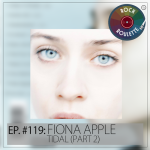
Episode 119 is here, and we’re wrapping up our review of Fiona Apple’s iconic debut Tidal. Does the second half solidify this 1996 release as a masterpiece? Tune in to hear our final thoughts!
Tidal is the debut studio album by American singer-songwriter Fiona Apple, released on July 23, 1996, by The WORK Group. Tidal produced three singles: “Shadowboxer“, “Sleep to Dream“, and “Criminal“. The latter was the album’s most popular single, winning a Grammy Award for Best Female Rock Vocal Performance in 1998. In 2017, Tidal got its first vinyl run as a “Vinyl Me Please” exclusive “Record of the Month”.
Tidal was received well by critics, with Jenny Eliscu of Rolling Stone and Richard Harrington of The Washington Post describing it as a mature effort comparable to the work of singer/songwriters Alanis Morissette and Tori Amos. In 2010, Rolling Stone ranked the album at number 83 among the 100 greatest albums of the 1990s. The following year, Slant Magazine placed it at number 74. The album is featured in the book 1001 Albums You Must Hear Before You Die. In 2022, Rolling Stone ranked the album at number 25 on its list of “100 Best Debut Albums of All Time”, claiming that it was “just the beginning—and Apple has kept topping herself artistically ever since.”
Musicians
Fiona Apple – vocals (all tracks), piano (1–3, 5–9), Optigan (2)
Jon Brion – vibraphone (1–3, 5–6, 9–10), guitar (1–2, 6, 10), tack piano (1, 3, 6, 9), marimba (2, 6), dulcitone (2), Chamberlin (4, 10), harp (8, 10), Optigan (8)
Patrick Warren – Chamberlin (1–3, 5–6, 8–10), piano (1, 4)
Greg Leisz – pedal steel guitar (2, 8)
Rob Laufer – guitar (4)
Dan Rothchild – bass (1, 4, 8, 10)
Greg Richling – bass guitar (2–3, 5)
Sara Lee – bass guitar (6, 9)
Matt Chamberlain – drums (1–2, 4, 6, 8–10), percussion (1, 6, 10)
Danny Frankel – drums (3, 5), percussion (6)
George Black – drum programming (6)
Van Dyke Parks – string arrangement (7)
Ralph Morrison – first violin
Claudia Parducci – second violin
Evan Wilson – viola
Larry Corbett – cello
Amber Maggart – harmony vocals (9)
Production
Andrew Slater – production
Mark Endert – recording, mixing
Claude “Swifty” Achille – additional engineering
Brian Scheuble – additional engineering
Jim Wirt – additional engineering
Niko Bolas – additional engineering
Troy Gonzalez – assistant engineering
Al Sanderson – assistant engineering
Tom Banghart – mixing assistance
Ted Jensen – mastering
Valerie Pack – production coordination
Art Direction
Nathaniel Goldberg – photography
Fred Woodward – art direction
Intro Music/Wheel Spin Music by LiteSaturation from Pixabay

Fair Use
* Copyright Disclaimer Under Section 107 of the Copyright Act 1976, allowance is made for "fair use" for purposes such as criticism, comment, news reporting, teaching, scholarship, and research. Fair use is a use permitted by copyright statute that might otherwise be infringing. Non-profit, educational, or personal use tips the balance in favor of fair use. No copyright infringement intended. ALL RIGHTS BELONG TO THEIR RESPECTIVE OWNERS
This is our musical reaction, breakdown, and commentary analysis of the song. We intend no copyright infringement, and this is not a replacement for listening to the artist's music. The content made available through this site is for educational and informational purposes only.
The site may contain copyrighted material owned by a third party, the use of which has not always been specifically authorized by the copyright owner. Notwithstanding a copyright owner’s rights under the Copyright Act, Section 107 of the Copyright Act allows limited use of copyrighted material without requiring permission from the rights holders, for purposes such as education, criticism, comment, news reporting, teaching, scholarship, and research. These so-called “fair uses” are permitted even if the use of the work would otherwise be infringing. *





